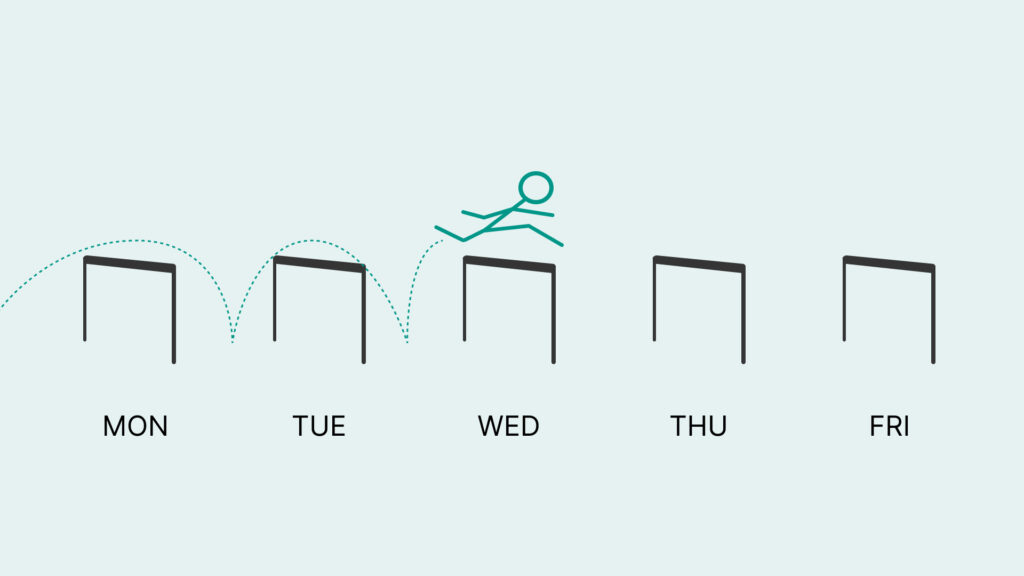A reader named Chris shared the following with me:
“For me, the biggest challenge is coming up with realistic plans. I always overestimate what I can actually get done in any given day or week and then get discouraged.”
This is something many productivity-minded believers struggle with. As Christians, we recognize our lives are a stewardship from God. So naturally, we want to make the most of the time we’ve been given. That means when it comes to planning our days, we can be overly ambitious, listing all the tasks we hope to complete. And many times, our daily lists end up being far more than anyone could ever accomplish in a day.
Even though it might feel great on those rare days when you do finish everything on the list, the far more common occurrence is that you don’t. And when you stack up day after day of incomplete plans, it leads to discouragement.
Thankfully, these little failures to meet our standards have a silver lining: they remind us of our ongoing need for God’s grace. Our undone to-do lists are a means God uses to humble us. Still, this cycle of plan, fail, self-criticize is not one we want to keep on repeating. It’s discouraging and counterproductive to a fruitful Christian life.
So here’s the problem I want to address in this essay: How do we set ambitious goals without being disappointingly unrealistic in our daily plans?
One solution is the two-bar strategy.
Raise the bar for your long-term goals

If you’ve ever played sports, you’ve probably had a coach try to inspire you to “raise the bar.” The “bar” represents an aspiration of excellence. Having a high bar means holding yourself to a high standard. And having high expectations for ourselves is a good and God-honoring thing.
When I started writing Redeeming Productivity (the book), that was a big, ambitious goal. I mean, we’re talking tens of thousands of words. I’d written blog posts and even a short booklet before, but this? This was raising the bar. It would have been much easier not to put that burden on myself, to aim lower. But I was convinced that even though it was daunting, and I questioned how I would ever get it done, writing that book would be worth the effort and it would honor God.
God has called us to excellence, not as a means of gaining or maintaining our salvation and not as a way to make God somehow love us more, but His Word demonstrates again and again that excellence of effort flows from sincerity of faith. I want to serve my Lord well—at home, at work, and in my local church—because I love Him.
Hard work and ambitious goals are not antithetical to grace; they’re the fruit of it.
- “Work heartily as unto the Lord” (Colossians 3:23–24)
- “Do your best to present yourself to God as one approved” (2 Timothy 2:15)
- Offer yourself as “a living sacrifice” (Romans 12:1)
As I take great pains to demonstrate in Well Done: A Strategy for Life Stewardship, one important mark of a faithful steward is diligence.
How sad that believers are not known for our diligence, hard work, or high standards. Instead, if one wishes to observe great work, excellence of effort, and discipline today we are far more likely to find it in Silicon Valley, or among secular athletes and artists. Yet, these all labor for a prize that perishes while we labor for eternal reward.
“Every athlete exercises self-control in all things. They do it to receive a perishable wreath, but we an imperishable.”
1 Corinthians 9:25
In one sense, therefore, Christians should be the most ambitious people in the world. Not selfishly ambitious, but ambitious to honor the Lord in our families, work, and goals. We should be people with a high bar, leading lives marked by excellence of effort and big goals, not half-hearted attempts or laissez-faire attitudes.
Besides this, there are also loads of practical benefits to setting ambitious goals for ourselves. Having a high bar on your long-term objectives:
- Gives you clarity of purpose
- Provides a unifying motivation to your daily efforts
- Helps you to push through the hard times
It’s amazing how clarifying a big project can be. When I don’t have a book I’m writing or some other big goal, I often feel like I’m adrift. It’s hard to tell how my day-to-day work fits together. But it’s amazing how an ambitious goal brings clarity to everything else. You have something inspiring you’re aiming towards.
What I’m trying to say is that the solution to feeling overwhelmed and discouraged by your inability to do everything on your to-do list each day is not firstly to set smaller goals. Counter-intuitively it’s to raise the bar on your ambitions. This is the first bar.
But that’s just one half of the two-bar strategy.
Lower the bar for your days and weeks

Let’s return to our original question: How do we keep ourselves from overestimating what we can get done each day or week and then getting discouraged?
After reading what I wrote above, you probably think my advice to raise the bar could only make the problem worse!
But this is where the second bar comes in.
While having a high bar for our goals and domains of stewardship is incredibly helpful, many ambitious believers make the mistake of trying to jump that high bar every day.
Initially, I thought my daily writing goals needed to match the ambitiousness of the book writing project itself. But when I tried to hold myself to the standard of writing ten pages per day (a stupidly high daily goal), I almost never hit that daily page count. After a few days or weeks of missing the mark every day, I’d get so disappointed in myself that I’d put the manuscript away for weeks. Then began the beat down:
“Who are you kidding, Reagan? You don’t have the discipline to be a real writer.”
Do you think that impossibly high bar of daily effort was serving me well in my goal of completing the book? I can tell you it was not.
I think our logic goes something like this, “If I’m going to reach big goals, I’ve got to have full and frantic days.” But that’s just not true. God does call us to excellence, but it is not His desire that we live in a constant tornado of anxiety and discouragement.
The same apostle Paul who encourages us to have a high bar for our holy ambitions, also encourages us to have the ambition to lead a peaceful and quiet life.
and to make it your ambition to lead a quiet life: You should mind your own business and work with your hands, just as we told you
1 Thessalonians 4:11
I love this verse because it seems almost oxymoronic. Ambition usually speaks of big, exciting, loud aspirations. But Paul says, make it your ambition to lead a quiet life. Have big dreams for a small life.
But how do we square this Scripture’s call to excellence of effort? These two seem completely at odds with each other. Can you have an ambition for excellence and a quiet life? Yes. In the kingdom, high achiever doesn’t mean high anxiety. The high bar of excellence is not contradicted by the low bar of daily expectations of yourself.
In the kingdom, big things always come from little things. God’s greatest works often come from humble beginnings, from mustard seed to ten-foot tree, from leaven to loaf; small things and slow growth work together to create big results.
So it is with us and our goals. A reasonable day’s effort can do more to get you closer to the goal than impossible plans never accomplished. You can have peaceful days even in pursuit of prodigious goals.
A famous quote from Microsoft Founder Bill Gates summarizes this notion rather nicely.
“Most people overestimate what they can do in one year and underestimate what they can do in ten years.”
Bill Gates
We might even modify it slightly and say, “Most people overestimate what they can do in a day and underestimate what they can do in a year.”
Most of us get this exactly backward. We set mediocre long-term goals (or have no goals at all), but then we set absurdly ambitious goals for what we’ll get done each day and week: long to-do lists, packed schedules, and unrealistic plans. As a result, we get nowhere but constantly feel like we are failing to steward our time well. Always busy but never progressing toward anything significant.
If you embrace the two-bar strategy, you can quietly and peacefully march toward that high bar goal even while setting a low bar for simple, consistent daily effort.
These are the two bars. And taken together, they lead to the insanely effective combo of long-term clarity + short-term consistency.
How to use the two bars to get more done for the glory of God

There’s a saying in the Navy SEALs, “Slow is smooth, and smooth is fast.” You want to do things quickly, but more importantly, you want to do them right. Speed is important on the battlefield, but not at the expense of accuracy.
It’s easy to get over your skis when working toward an ambitious goal. We think since the bar is so high, we need to rush if we’re ever going to get there. But often, it’s better to lower your expectations when it comes to the day-to-day. Your daily goal isn’t to do all the things; it’s to consistently put in solid, quality work that pushes you closer to the big goal. Slow is smooth, and smooth is fast.
I eventually learned that managing my morale is more important than trying to hit an arbitrary goal for daily output for an ambitious project like writing a book. I discovered that when I finished a writing session with a sense of accomplishment instead of disappointment, I had the motivation to do it again the next day. Lowering the bar on what counted as a “good day of writing” allowed me to string together more successful days and, eventually, more pages. And all of this without the cycle of failure and regret.
Instead of trying to write the whole book in one sitting and beating myself up when I couldn’t live up to that expectation, I set an incredibly low bar for daily writing. I stopped trying to push myself to write for eight hours a day and decided 90 minutes every day was enough. It didn’t matter how much I got done in that time. It just mattered that I sat down, researched, outlined, wrote, or edited for an hour and a half every single day. It certainly took some discipline and a whole lotta prayer. But it was something I knew I could do every day. And it soon built up momentum.
When you start planning a more reasonable workload for your day, instead of demoralizing you it builds momentum. Day after day, you can leap over those low bars knowing that that small effort is bringing you closer to the high bar of your long-term goals.
Conclusion
Reaching ambitious goals isn’t about one-time efforts of herculean self-discipline. It’s a game of consistency. Little by little, you leap over the low bars you set for yourself each day, and eventually, one day, you turn around and realize you’ve flown right over that high bar too.
So raise the bar on your goals, but lower it for your days. You’ll find that you get much more done in the end. And you’ll enjoy a lot more peace along the way.

